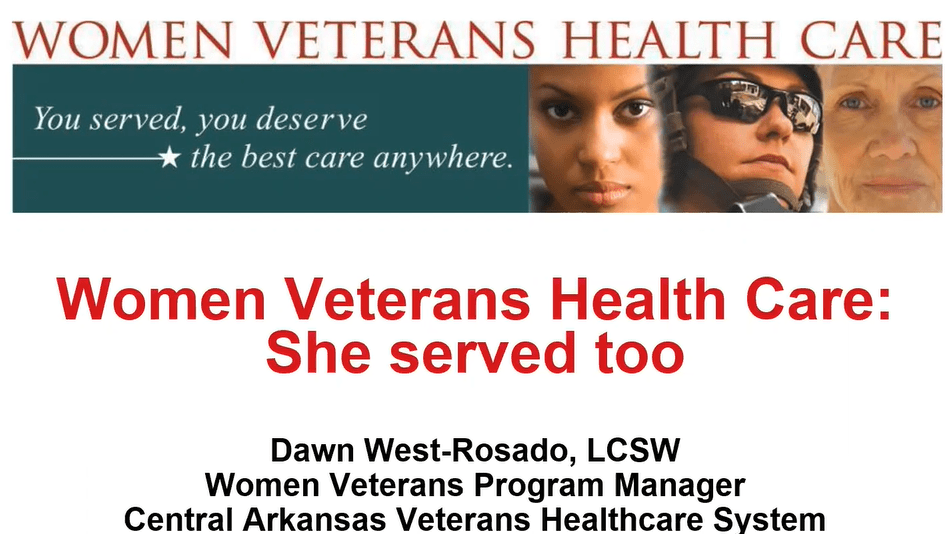Webinar Focuses on Health Care for Servicewomen
| April 11, 2022 | The University of Arkansas for Medical Sciences (UAMS) Veterans Subcommittee hosted an educational webinar in honor of Women’s History Month focusing on women veterans’ health care.
Dawn West-Rosado, a licensed clinical social worker and manager of the Women Veterans Program at Central Arkansas Veterans Healthcare System (CAVHS), facilitated the virtual event titled “Women Veterans Health care: She Served Too!”
“Women have come so far within the military and throughout history,” she said.
She asked participants to describe the first image that pops into their head when they think of women veterans.
“A lot of times people’s thoughts are not aligned with who our women veterans are and how they have evolved,” West-Rosado said.
Part of her goal is to get people to rethink their definition of a veteran and their view of a female veteran, she said.
When thinking of scenes on television in the early 2000s, West-Rosado recalled seeing videos of only male military members surprising their kids at school after a long deployment, and reporters referring to veterans as “servicemen,” rather than “service members.” There was little to no focus on servicewomen.
Today, women comprise more than 15% of all active-duty military, nearly 18% of all National Guard and Reserve, 10% of the veteran population and 20% of all new military recruits. Since 2000, the number of women veterans using the Veterans Health Administration has nearly doubled.
Regardless, people still assume that a woman at a military event is a sister, spouse or mother of a veteran. West-Rosado told a story of a servicewoman parking in a veterans parking spot who came back to a note on her windshield saying space is only for veterans.
“Women have not always been given credit for their contributions even though there is documentation that women have served in many wars,” she said.
As military culture has changed, the Veterans Health Administration has had to catch up and rethink what services need to be available for women veterans.
“Women are made differently and have different medical needs. So, we have been working to fill the gaps to get them equal care,” she said.
As far as what providers can do for women veterans, West-Rosado said not to ask if they are a veteran because there are different definitions, but rather ask if they have ever served.
Providers should also think about service-connected disabilities. Many women served in areas with burn pits and sandstorms, which can lead to chronic respiratory issues. Many women veterans now deal with frequent urinary tract infections due to not having easy access to bathrooms while in deployed locations.
Women in the military have a high rate of sexual trauma, and many don’t feel comfortable speaking about it for several years. The John L. McClellan Memorial Veterans Hospital in Little Rock started sexual trauma groups to help women who have been victims of sexual assault while they served.
West-Rosado also said it is not uncommon for female veterans to have post-traumatic stress disorder, depression and anxiety. Providers should be aware of possible triggers and fully explain what they are doing, especially when it comes to wellness exams, to avoid causing a PTSD response.
Although not every VA hospital caters to women’s needs, the Little Rock hospital has specific women’s specialty services and designated providers outside of its women’s clinic. All providers maintain competencies and ongoing education for conditions specific to women. They also have an LGBTQ+ program to provide support to transgender women veterans.
“I hope I’ve expanded people’s thoughts about who out women veterans are and what their contributions are,” West-Rosado said. “It’s amazing what our women have accomplished throughout the years.”
